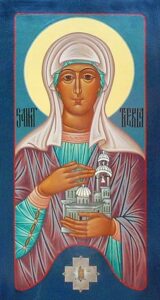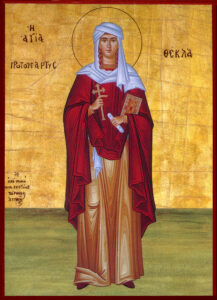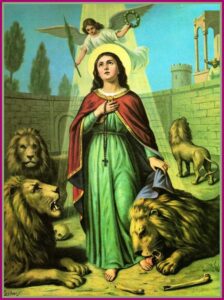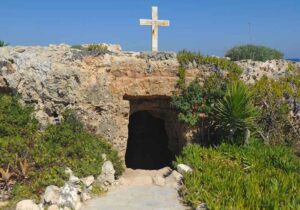St. Thecla (Thekla), the Martyr – Sep 24

St Thecla (Thekla) was a contemporary of St. Paul, the Apostle. She became an evangelizer and a disciple after hearing his teachings.St. Thekla was also companion of the Apostle Paul in 1st century and accompanied St. Paul in founding Churches, because her witness converted so many others to Christ, and she was one of the first woman martyrs for the Christian Faith.
Thecla was born into a rich, prosperous pagan family in the Lycaonian city of Iconium, a town in Asia Minor. She was expected to marry and marry well. When she was 18 years old, her mother had picked out for her, a young man Thamyris. He had an excellent position and could offer Thecla a secure life. This was important during those days only marriage assured a stable place in society, with children to carry on the family name and moreover an unmarried woman did not get support or money.
St. Paul, the Apostle and St. Barnabas who had been in Antioch, in AD 45, travelled to Iconium (Acts 14). He reached the city of Iconia (Asia Minor near the border of Greece) on his way to Greece. St. Paul preached there, and the speech inspired Thecla. Thecla’s mother Theokleia prohibited her from joining the crowds, which gathered to hear Paul preach. She sat in her open window for three days and nights, listening, to every word as Paul spoke about the blessings of giving everything to God. She was so absorbed in his message, that she neither ate nor drank for three days. She was particularly touched by his call to chastity. She promptly became a Christian and decided to remain unmarried and celibate, as Paul advised. Thecla decided to devote her life to Jesus Christ.
However, her parents discouraged her, and her fiancé Thamyris was furious and complained to the local governor that Paul was giving a bad influence. Her father was the governor of Iconia and because Thamyris was so prominent and influential, St. Paul was arrested and imprisoned. When Thekla learned of Paul’s arrest she secretly went to the prison, by bribing the guard with her gold bracelet and gained admittance to his cell. When she saw the Apostle, she knelt before him and kissed the chains which bound his hands and feet. She remained there a long time listening to his message of the Good News of Jesus Christ. After the governor chastened Paul for the disturbances, he had caused in the city, he had him stoned and expelled from Iconium. The governor, then gave order to burn his daughter, Thecla, unless she renounced Christ. Her mother was so angry at her daughter’s disobedient ‘madness’ that she wouldn’t intervene. Thekla refused to renounce her Heavenly Bridegroom, she was taken to the arena for punishment.

They arranged a fire to burn Thecla. Many people gathered there to see this. Thecla came forward and said: “O God of St. Paul, accept Thy maiden’s soul for I wish to embrace you.” Suddenly the sky became cloudy, and thunder and lightning came with a sudden The sudden down pour that came, on Thecla, the fire got extinguished. Those gathered there become afraid and they ran home.
After the above incident Thecla stayed at the house of Onivoros, her neighbour. That family was praying for Thecla. Then, her father ordered that Thecla be thrown to wild animals. They sat at her feet, like sheep. The crowd wondered at this sight and praised God. Then, Thecla was tied to the horns of a bull. Fire came down and the rope was burnt, and the bull attacked those assembled there to see the torture. Thecla was tortured by being made to stand in a room full of serpents. The serpents left the room. Thecla was tortured, but God delivered her from death.
Finally, the governor ordered to execute her by beheading, but she escaped to Antioch and soon met Paul there. She helped him preach, and together they did good work for the Lord. The governor and the people of Antioch hastened to see Thecla. The governor asked Thecla about her journey. Thecla said: “I am the maid of God who created everything. I believe in Jesus Christ and in his Holy Cross”. Thecla repeated the speech of St. Paul that she heard at Iconia. Thus, the governor believed in Jesus Christ.
In Antioch, a young nobleman named Alexander saw beautiful Thekla. He rushed forward and tried to seduce her, but Thekla fought him off. Alexander complained to the governor of Antioch, that this wandering girl had disgraced him, in public. He demanded that she be punished with death. The governor complied and ruled that Thekla would face the wild beasts in the arena. Thecla’s only reply was that she be allowed to preserve her virginity unto death. Her wish was granted, and she was given into the care of the noblewoman Tryphaena, a relative of Caesar, until the time of punishment.

When Thekla was taken to the arena, a lioness was set free to attack her. But to the astonishment of the crowd, the lioness sat tamely at her feet. A bear was then released, but as it came close to Thekla, the lioness rose to defend her and killed the bear. A large lion was then released. The lioness again came to Thecla’s defense killing the lion but losing her own life also. Then all the cages were opened, and many wild animals charged at the defenceless Thekla. After crossing herself and praying for courage, the Saint noticed a large tank of water which was nearby, containing the aquatic animals. She climbed into the water, asking that she might be baptized by Christ as she did so. Seeing that the beasts were unable to harm Thekla, Alexander asked that the Saint be given over to him for punishment. He tied her to two large bulls in the hopes that they would pull her asunder. But when the bulls charged off in opposite directions, the ropes which held Thekla to them were miraculously loosened and she was spared. Seeing that no harm could be done to Thekla, the authorities released her. She went to the home of Tryphaena where she remained for eight days preaching the Good News of Jesus Christ and converting Tryphaena and her entire household. When she departed from Antioch, Tryphaena gave her a treasure in gold and precious jewels.
Then she reached Al-Kalamoun, near Damascus, Syria. The soldiers were after her. There few farmers were sowing wheat. Thecla raised her eyes to heaven and prayed that the wheat may be ready to reap. In a short while, the wheat field was ready for harvesting. The soldiers who were following her got confused and Thecla escaped capture. Thecla reached Malula, which is a hilly place. She was so tired that she could not climb the hill. She knelt down and prayed: “God, you saved me from wild animals, the blazing fire, and the torture of my father. You helped me to travel a long distance and to reach this place safely.” At this time the rock on which she was standing split into two and she landed safely in the opening. A stream started flowing beneath her feet. This rock is said to be still there, at Malula. She spent the rest of her life in this den in prayer, and worship of God. She used to pray for the sick and they were healed. She lived in the den eating green leaves and drinking water until her death. The Arabic word Malulin means ‘the mother of ailing’. The people at Malula speak the Aramaic dialect of Syriac, which Our Lord Jesus Christ spoke. Through her prayer, she converted many and gathered other women monastics around her. She counselled people and healed the sick, never asking for money. The site of her cave was identified in Syria near the modern-day city of Maloula. A Church was built in the mouth of the cave in very early times, and later the site became home to a large monastery, the Mar Taqla. The Mar Taqla Monastery has been around, in one form or another, ever since.

St. Thecla is referred to in the books titled, Apocryphal Acts of Paul and Thecla, Book of women and Book of Thecla. She is also mentioned various thesis titled, Thecla in Syriac Christianity. Mar Severios of Antioch, in his homily, has compared the sufferings of Thecla to that of Shadrach, Meshach and Abednego (Daniel 3) and to that of Daniel (Daniel 6).

Early Church fathers have affirmed about St. Thecla. The prayers, in the Eastern Orthodox, on the feast of St. Peter & St. Paul do mention this Martyr. The prayer at the time of death of faithful seeks the intercession of St. Thecla, the Martyr The feast of Thecla is celebrated on 24 September
1 Comment
Beena John · September 24, 2023 at 10:32 pm
The prayers of Saints are a stronghold for us.